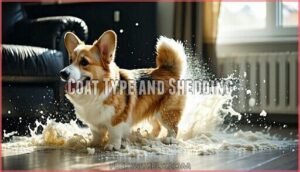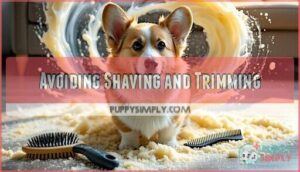This site is supported by our readers. We may earn a commission, at no cost to you, if you purchase through links.
 Yes, corgis shed extensively throughout the year.
Yes, corgis shed extensively throughout the year.
You’ll find their fur everywhere – on clothes, furniture, and floors.
Their double-coated dogs experience peak shedding twice yearly during spring and fall when they "blow their coat."
Even during calmer months, you’ll notice constant hair loss.
Their thick undercoat and longer topcoat work together to protect them, but this means serious shedding for you.
Don’t panic though – it’s completely normal and manageable.
Regular brushing helps control the fur storm, though you can’t eliminate it entirely.
The key lies in understanding their shedding patterns and choosing the right grooming tools.
Table Of Contents
- Key Takeaways
- Corgi Shedding Basics
- Do Corgis Shed a Lot
- Corgi Shedding Patterns
- Reasons for Corgi Shedding
- Managing Corgi Shedding
- Reducing Corgi Shedding
- Corgi Shedding Prevention
- Frequently Asked Questions (FAQs)
- Are corgis high maintenance?
- Do corgis shed excessively?
- What are the cons of a corgi?
- Why are corgis not cuddly?
- Is there a way to reduce shedding in Corgis?
- Do Corgis shed more than other breeds?
- Is it necessary to use a de-shedding tool for Corgis?
- Are there any specific breeds of Corgis that do not shed as much?
- Can air purifiers help with Corgi shedding?
- What vacuum works best for Corgi hair?
- Conclusion
Key Takeaways
- You’ll face constant shedding year-round – Corgis shed daily due to their double coat, with peak "blowout" seasons in spring and fall lasting 2-4 weeks each
- Regular brushing is your best defense – Brush 3-5 times weekly during normal periods and daily during peak seasons using deshedding tools like undercoat rakes and slicker brushes
- Quality nutrition directly impacts shedding levels – Feed high-quality dog food with omega-3 fatty acids and proper protein to strengthen hair follicles and reduce excessive fur loss
- Never shave your corgi’s double coat – Shaving disrupts their natural temperature regulation and can cause overheating, sunburn, and permanent coat damage
Corgi Shedding Basics
Corgis shed daily because they’ve double-coated fur that protects them in all weather conditions.
You’ll notice their shedding increases during seasonal changes, especially when winter turns to summer and summer turns to winter, due to their double-coated fur.
Double-Coated Fur
Your corgi’s double coat acts like nature’s perfect insulation system.
Your corgi’s fur isn’t just cute—it’s a natural weatherproof jacket working 24/7.
The dense undercoat traps warm air close to the skin, while guard hairs repel water and debris.
This coat function makes corgis well-suited for various weather conditions.
The undercoat density creates excellent insulation properties, but it’s also why corgi shedding becomes such a significant challenge for dog breeds with double coats.
Seasonal Shedding Patterns
Understanding seasonal shedding helps you prepare for the fur avalanche ahead.
Your corgi experiences two major corgi shedding seasons annually: the Spring Blowout and Fall Undercoat renewal.
Temperature influence triggers coat adaptation as your double coat adjusts to weather changes.
Regional variations affect timing, but expect intense seasonal shedding lasting 2-4 weeks during these peak corgi coat type shifts.
Corgis have a distinct double coat composed of a soft undercoat and a waterproof outer coat.
Age and Shedding
Your puppy’s shedding journey begins around 8-13 months when puppy coat loss starts.
During this period, your corgi’s fluffy puppy coat transforms into their dense adult coat.
Senior dog shedding may increase due to weaker hair follicles, and coat quality changes throughout these shedding life stages, with age-related factors affecting intensity.
Each age brings different corgi shedding patterns you’ll need to manage, and corgis are known for their significant shedding due to their double coat.
Diet and Stress Reduction
Poor nutrition acts like gasoline on the corgi shedding fire. Your dog’s diet directly impacts coat health, while stress triggers excessive fur loss.
Quality dog nutrition with proper protein intake and Omega-3 benefits strengthens hair follicles.
Key stress triggers affecting shedding:
- Environmental changes and loud noises
- Separation anxiety and schedule disruptions
- Poor hydration importance and low-quality dog food
Anxiety reduction through consistent routines helps minimize excessive corgi shedding naturally.
Do Corgis Shed a Lot
Heavy shedding is the reality you’ll face with these adorable herding dogs. Corgis are classified as high-shedding dogs due to their dense double coat, and if you’re wondering how much do corgis shed, prepare for daily hair tumbleweeds rolling across your floors.
Brace yourself for daily fur storms – corgis turn your home into a hairy wonderland year-round.
The shedding frequency is relentless – it’s not just twice yearly like some breeds, but a constant process** that intensifies during peak seasons. Coat density plays a major role in corgi shedding, with their thick undercoat designed for weather protection creating more loose fur.
There’s minimal breed differences between Pembroke and Cardigan Welsh Corgis regarding hair loss levels. Your owner expectations should include investing in quality vacuums and lint rollers. While grooming impact can reduce the volume of loose fur, you can’t eliminate corgi excessive shedding entirely.
Corgis thrive on attention, so owners should be aware that separation anxiety is common. Accept that corgi breed shedding is simply part of owning these lovable, furry companions.
Corgi Shedding Patterns
You’ll notice your Corgi sheds most heavily during spring and fall when their double coat switches between seasons.
Throughout the rest of the year, you can expect consistent daily shedding as loose hairs naturally fall from both their dense undercoat and protective outer layer.
Peak Shedding Seasons
Your corgi experiences two major corgi shedding seasons annually.
Spring Blowout occurs when winter coats shed for lighter summer coverage. Fall Blowout happens as thick winter coats develop.
Temperature Influence drives these shedding season cycles through Coat Adaptation mechanisms.
Regional Variations affect timing – warmer climates may experience less dramatic summer shedding and winter shedding cycles than colder regions.
Corgis also experience shedding as they move from their puppy to adult coat, with shedding typically starting around the time of hormonal changes.
Year-Round Shedding
Unlike dogs that shed only seasonally, your Corgi’s daily hair loss never stops.
This constant grooming need means you’ll find fur on furniture, clothes, and floors regardless of the season.
Environmental impact affects your home cleanliness substantially, requiring consistent maintenance.
Managing owner expectations about Corgi shedding frequency helps you prepare for ongoing Corgi shedding control solutions, which is crucial for daily hair loss.
Coat Type and Shedding
Your corgi’s double coat directly impacts how much hair you’ll find around your home.
This dense fur system creates a constant cycle of corgi hair loss that varies by individual dog.
Understanding coat variations helps you prepare for what’s ahead:
- Guard hair function – Outer layer protects the softer undercoat beneath
- Undercoat insulation – Dense inner layer regulates body temperature year-round
- Coat color shedding – Darker colors show less on furniture than lighter shades
Reasons for Corgi Shedding
You’ll find several key factors drive your Corgi’s constant shedding, from their natural double-coat structure to health and environmental influences.
Understanding these causes helps you manage the fur situation more effectively and identify when excessive shedding might signal underlying issues, related to their natural double-coat structure.
Double Coat Structure
Understanding your corgi’s double coat explains why they shed so much.
The outer layer contains protective guard hairs that repel water and debris.
Beneath lies a dense undercoat providing insulation properties for temperature regulation.
These coat layers work together for seasonal adaptation, with the undercoat density changing throughout the year to keep your corgi comfortable in varying weather conditions.
Poor Diet and Malnutrition
Your corgi’s diet directly affects coat health and shedding intensity.
Dietary deficiencies in protein intake and omega supplements weaken hair follicles, causing excessive fur loss.
Poor dog food lacking essential nutrients creates dull, brittle coats that shed constantly.
Malnutrition impacts hydration levels too.
Quality dog diet with proper nutrition strengthens hair roots, reducing daily shedding substantially, with proper nutrition being key to a healthy coat, and a quality dog diet can make a significant difference, and essential nutrients are vital for coat health.
Hormonal Changes and Allergies
Beyond nutrition issues, hormonal changes create significant shedding spikes in your corgi.
Hypothyroidism shedding occurs when thyroid levels drop, weakening hair follicles. Pregnancy shedding happens during hormonal fluctuations.
Allergies trigger excessive scratching and skin irritation. Food allergies and flea allergy dermatitis cause persistent itchiness.
These corgi shedding reasons require veterinary attention to address underlying hormonal changes effectively, including issues like hypothyroidism shedding and persistent itchiness.
Managing Corgi Shedding
You can’t stop your Corgi from shedding, but you can control how much fur ends up on your furniture and clothes.
The right combination of regular grooming, proper nutrition, and smart care techniques makes managing your Corgi’s shedding much easier.
Regular Grooming
Daily brushing with proper deshedding tools forms your frontline defense against corgi shedding chaos.
You’ll need consistent brushing frequency—at least three times weekly during normal periods, increasing to daily during peak seasons.
Selecting the right tools is key, so consider various deshedding options for the best results.
Professional grooming every 6-8 weeks, combined with monthly bathing techniques and regular nail trimming, creates an effective corgi grooming routine that substantially reduces loose fur throughout your home, which is a crucial part of managing loose fur and maintaining a clean environment with regular nail trimming.
Healthy Diet and Supplements
Your Corgi’s diet directly impacts shedding levels.
Feed high-quality dog food with protein sources like chicken or salmon. Add fish oil supplements containing omega3 for coat health – these provide significant Omega-3 Benefits.
Proper Hydration Importance can’t be overlooked either. One option worth exploring is corgi homemade dog food to control ingredients.
While quality dog food increases Diet Cost, investing in premium nutrition and dog supplements reduces excessive fur around your home.
Avoiding Shaving and Trimming
Never shave your Corgi’s double coat – it’s like removing their natural thermostat.
Shaving Risks include overheating, sunburn, and permanent coat damage that disrupts Temperature Regulation. Light trimming around paws and sanitary areas offers Trimming Benefits without compromising Coat Protection.
Grooming Alternatives for corgi shedding solutions:
- Use deshedding tools instead of clippers for corgi hair shedding control
- Focus on regular brushing as primary corgi grooming tips strategy
- Trim only problem areas like matted fur or hygiene zones
- Professional groomers understand proper grooming techniques for double coats
- Consider cooling mats and fans rather than removing protective fur layers
Reducing Corgi Shedding
You can’t completely stop your Corgi’s shedding, but you can substantially reduce the amount of fur floating around your home.
The right combination of daily brushing, proper nutrition, and specialized tools will help you control this natural process and keep your living space cleaner.
Daily Brushing and Bathing
Your grooming routine forms the foundation of shedding control. Brushing frequency should be daily during peak seasons, 2-3 times weekly otherwise. Use deshedding tools like the FURminator for best results.
Corgis typically need bathing every 4-6 weeks, but you may need to adjust based on their activity and environment.
| Grooming Aspect | Frequency | Best Practice |
|---|---|---|
| Brushing | Daily (peak season) | Use slicker brush first |
| Bathing | Monthly | Lukewarm water only |
| Professional Grooming | Quarterly | Schedule before shedding seasons |
Controlling Diet and Environment
Feed your corgi high-quality dog food rich in omega-3 fatty acids to strengthen hair follicles and reduce excessive shedding.
Monitor hydration levels daily, as dehydrated dogs shed more. Address environmental stressors like temperature changes and allergens that trigger coat problems.
Consider supplement choices like fish oil for healthy diet support. Proper corgi diet and allergy management substantially minimize dietary impact on shedding.
Using Deshedding Tools
Professional deshedding tools make all the difference in managing corgi shedding.
You’ll want stainless steel undercoat rakes and slicker brushes designed for double-coated breeds.
Brush 3-5 times weekly using gentle 45-degree strokes.
The HappyDogz Magic Pro and FURminator rank among the best tool brands.
Many owners find success using specialized tools for corgis.
Clean your dog shedding tools after each session to prevent bacteria buildup and maintain effectiveness.
Corgi Shedding Prevention
While you can’t completely stop your Corgi from shedding, you can substantially reduce the amount of fur around your home through consistent preventive care.
Regular vet checkups, proper nutrition, and maintaining a structured grooming routine will help you stay ahead of excessive shedding before it becomes overwhelming, allowing for better management of your Corgi’s shedding.
Regular Checkups and Monitoring
Your vet becomes your best ally in managing excessive shedding through thorough health monitoring.
Regular checkups help identify underlying issues before they become major problems.
Here’s what professional monitoring should include:
- Annual skin health examinations to assess coat condition and detect dermatitis early
- Parasite detection screenings for fleas, ticks, and mites causing irritation
- Allergy testing protocols to identify environmental or food sensitivities
- Early diagnosis blood panels revealing hormonal imbalances affecting coat
- Nutritional deficiencies assessment through extensive wellness evaluations
Maintaining Coat Health
Your corgi’s coat health depends on consistent care routines that address both internal and external factors.
Dietary Impact plays a major role in double coat strength, while Supplement Options like omega-3 fatty acids support healthy hair growth.
Grooming Frequency should match your dog’s shedding patterns, and proper Bathing Techniques remove loose fur without stripping natural oils.
Hydration Importance can’t be overlooked for ideal dog coat health, and many owners find that a corgi coat supplement can improve coat quality with the right care routines.
Minimizing Shedding With Proper Care
Proper corgi shedding management combines consistent grooming techniques with smart diet impact choices.
You’ll control shedding by establishing ideal bathing frequency and exploring supplement options when needed.
Dog grooming becomes manageable through daily brushing and quality nutrition.
Consider professional help for severe cases.
Effective corgi shedding control requires patience and the right dog shedding approach for lasting results.
Frequently Asked Questions (FAQs)
Are corgis high maintenance?
Wondering if you’re ready for the commitment?
Corgis aren’t exactly high-maintenance, but they’re not low-maintenance either.
You’ll need daily brushing, regular exercise, and patience with their stubborn streak and constant shedding.
Do corgis shed excessively?
Yes, you’ll deal with significant shedding year-round.
These double-coated dogs lose hair daily, with intense "coat blowouts" twice yearly during seasonal changes.
Regular brushing and quality nutrition help manage but won’t eliminate the constant fur tumbleweeds, and this is due to their natural process of shedding, making regular grooming essential.
What are the cons of a corgi?
Heavy shedding creates constant fur cleanup, while their stubborn streak makes training challenging.
You’ll face potential back problems from their long spine, plus high energy needs requiring daily exercise and mental stimulation, which can be considered a constant issue due to their high energy needs.
Why are corgis not cuddly?
Corgis aren’t typically lap dogs due to their independent, working-dog nature.
They’re bred for herding, making them active and alert rather than cuddly.
However, individual personalities vary—some corgis enjoy snuggling more than others.
Is there a way to reduce shedding in Corgis?
You can’t eliminate shedding, but regular brushing, quality diet with omega-3s, monthly baths, and maintaining your corgi’s health will substantially reduce loose fur around your home.
Do Corgis shed more than other breeds?
Like leaves falling from an autumn tree, your Corgi’s fur will outpace most breeds.
Their double coat makes them heavy shedders compared to single-coated dogs, requiring you to embrace daily grooming as part of ownership.
Is it necessary to use a de-shedding tool for Corgis?
Yes, you’ll definitely want a de-shedding tool for your Corgi.
These specialized brushes effectively remove loose undercoat fur that regular brushes miss.
This substantially reduces the hair tumbleweeds rolling around your home daily.
Are there any specific breeds of Corgis that do not shed as much?
Both Pembroke and Cardigan Welsh Corgis shed heavily due to their double coats.
There aren’t any low-shedding Corgi breeds – all varieties shed substantially year-round, with no notable difference between the two main types.
Can air purifiers help with Corgi shedding?
Air purifiers can capture some floating Corgi hair and dander, improving your home’s air quality.
However, they won’t substantially reduce shedding itself—you’ll still need regular brushing and vacuuming for effective fur management.
What vacuum works best for Corgi hair?
Finding fur tumbleweeds rolling across your floors like desert brush? You’ll want a Dyson or shark vacuum with strong suction and specialized pet attachments to tackle Corgi’s double-coat shedding effectively.
Conclusion
Managing your corgi’s shedding doesn’t require a miracle—just consistent effort and the right approach.
Yes, corgis shed extensively, but you’ve now got proven strategies to tackle the fur tsunami.
Regular brushing, proper nutrition, and quality grooming tools will dramatically reduce loose hair around your home.
Remember, shedding is natural and healthy for your corgi’s double coat.
Stay consistent with your grooming routine, and you’ll transform that overwhelming fur storm into something completely manageable.
















